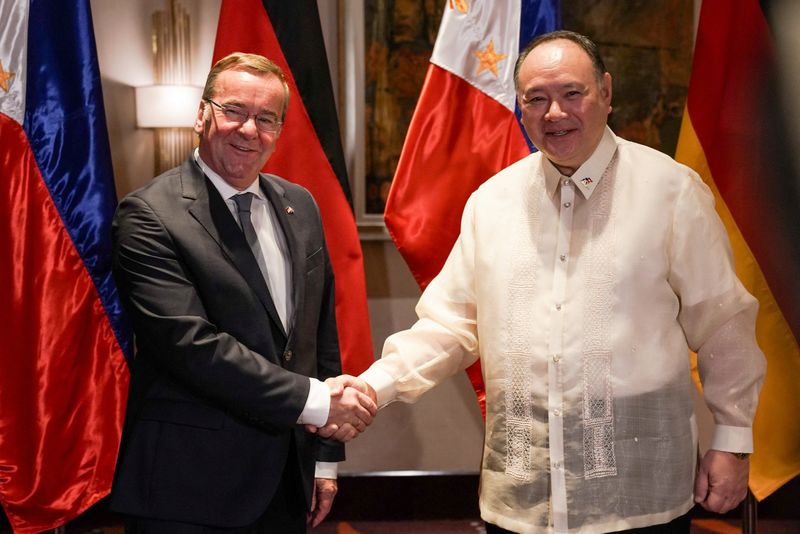By Karen Lema
MANILA (Reuters) – The Philippines and Germany pledged on Sunday to sign a defense cooperation agreement this year, vowing to uphold the international rules-based order in the Indo-Pacific region.
German Defense Minister Boris Pistorius and his Philippine counterpart Gilberto Teodoro have pledged to build long-term relations between their militaries to expand bilateral training and exchanges, explore opportunities to expand bilateral arms cooperation and engage in joint projects.
The two met in Manila during the first visit by a German defense minister, marking 70 years of diplomatic relations between their countries.
Teodoro said the Philippines, which is seeking to modernize its military to enhance external defense, “will seek to engage Germany as a possible supplier of these capabilities.”
“These fall under command and control, air denial, maritime dominance, air dominance and the most technologically advanced equipment,” Teodoro said in a press conference with Pistorius.
Manila and Berlin are strengthening military ties as tensions between China and the Philippines have risen in recent months, with the Philippines exchanging accusations over clashes in disputed areas of the South China Sea, including that China intentionally rammed Manila’s navy vessels, seriously injuring a Filipino sailor.
China claims sovereignty over most of the South China Sea, including areas claimed as exclusive economic zones by Vietnam, the Philippines, Malaysia, Brunei and Indonesia. In 2016, the Permanent Court of Arbitration in The Hague said Beijing’s claims had no legal basis. China rejects that decision.
“This ruling stands, without exception,” Pistorius said. “It is our duty to strengthen the maritime border and we are respecting it.”
The South China Sea is a key trade route, carrying more than $3 trillion in seaborne trade each year.
Teodoro said the Philippines is not provoking China and is not seeking war, but reiterated Manila’s position that the sole cause of the conflict in the waterway “is China’s illegal and unilateral attempt to appropriate most, if not all, of the South China Sea.”
China has expressed concern about growing ties between NATO members and Asian nations such as Japan, South Korea and the Philippines, as Washington and its partners expand alliances and partnerships, including those that span the globe.
Germany on Friday joined the U.S.-led United Nations Command in South Korea, becoming the 18th nation in a group that helps guard the heavily fortified border with North Korea and has pledged to defend the South in the event of war.

Pistorius said the move was evidence of Berlin’s firm belief that European security was closely linked to security in the Indo-Pacific region.
Germany’s commitments and positions in the region “are not directed against anyone,” Pistorius said in Manila. “On the contrary, we are focusing on maintaining the rules-based order, ensuring freedom of navigation and protecting trade routes.”





